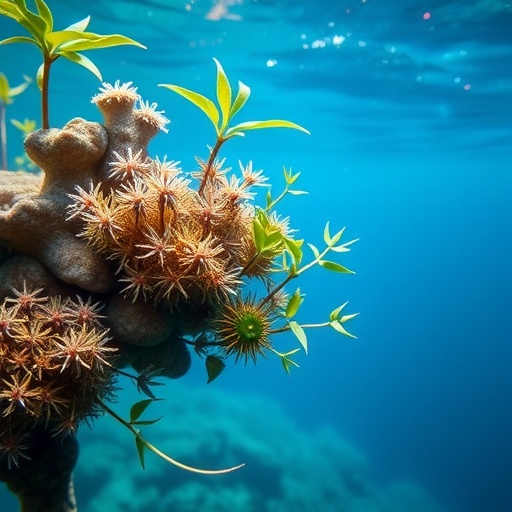In the murky depths of the Mediterranean Sea, a fascinating marine organism is capturing the attention of researchers and environmentalists alike. The bamboo coral, scientifically known as Isidella elongata, has emerged as a vital indicator of the health of vulnerable marine ecosystems. This exceptional coral species, which thrives in deep-sea environments, holds secrets about the age and growth patterns that could provide critical insights into the ecological fate of Mediterranean waters. A recent study authored by Carbonara, Chimienti, Bellodi, and colleagues delves into these depths, revealing insights that could change our understanding of marine biodiversity in the face of climatic change.
Isidella elongata, often referred to as bamboo coral due to its structural resemblance to bamboo, plays a crucial role in providing habitat for various marine species. Found in the cold, deep regions of the Mediterranean, these corals can grow up to several meters tall, creating complex three-dimensional habitats that support a diversity of marine life. The health and longevity of bamboo coral populations are essential indicators of the overall health of marine ecosystems, as their presence and growth can signify the broader environmental conditions of their habitats.
The recent research not only examines the age and growth rates of bamboo corals but also emphasizes their vulnerability to environmental changes. As ocean temperatures continue to rise and human activities increase, these corals are facing unprecedented threats. The study’s findings indicate that understanding the longevity of these corals could provide crucial data on how effectively they can withstand environmental stressors, thereby serving as a bellwether for the health of other marine species dependent on similar ecosystems.
Using advanced methodologies such as sclerochronology, a technique that studies the growth rings of calcareous marine organisms, researchers have been able to accurately assess the age of Isidella elongata. By analyzing these growth rings, scientists have discovered that some specimens can live for over a hundred years. This astonishing lifespan makes the bamboo coral one of the longest-living marine organisms, highlighting its resilience and capability to adapt to fluctuating environmental conditions over centuries.
Moreover, the researchers highlighted the importance of growth rates, which can reveal critical information about nutrient availability, water temperature, and overall ecosystem health. Understanding these growth dynamics is essential for developing conservation strategies aimed at protecting vulnerable marine ecosystems. As environmental pressures mount, knowing how quickly these corals can grow under ideal versus suboptimal conditions becomes paramount.
The implications of the findings are profound, as they could inform both conservation efforts and policy decisions. By recognizing the significance of Isidella elongata as a sentinel species, marine biologists and policymakers can prioritize areas of the Mediterranean for protection, ensuring that these vital ecosystems receive the attention they desperately need. The evidence presented in the study urges governments and environmental organizations to take action to mitigate human impacts on these habitats, including climate change, pollution, and unsustainable fishing practices.
While the primary focus of the research resides in understanding the growth and age of bamboo corals, it also raises awareness about broader environmental issues. The study underscores the interconnectedness of marine species, emphasizing that the health of the bamboo coral directly influences the entire marine community. Protection of these corals will not only safeguard them but will also uphold the diverse species that rely on their structures for habitat and sustenance.
The study by Carbonara and colleagues marks a significant step toward unraveling the complexities surrounding marine ecosystems. It urges the scientific community to further investigate the ecological roles of long-lived coral species in the Mediterranean and beyond. As research continues to uncover the resilience of these ecosystems, it is increasingly crucial for interdisciplinary collaboration to occur. By combining marine biology, conservation science, and climate research, a comprehensive understanding of these corals can be achieved, leading to more effective conservation strategies.
Furthermore, the research emphasizes the necessity of ongoing monitoring and assessment of marine ecosystems, particularly those housing vulnerable indicators like bamboo coral. Technological advancements, including remote sensing and environmental DNA analysis, offer new tools for scientists to track and study the health of marine ecosystems. Integrating these technologies with traditional ecological methods can result in a holistic approach to marine conservation, allowing for timely and effective interventions.
The plight of Isidella elongata reflects a larger narrative of the threats faced by marine ecosystems globally. Climate change, overfishing, habitat destruction, and pollution present daunting challenges that demand urgent action. The insights gained from studying bamboo corals serve as a clarion call to prioritize the protection of marine biodiversity, advocating for responsible stewardship of our ocean resources.
As we navigate through this era of unprecedented ecological change, the findings pertaining to bamboo coral must not only be recognized but embraced. It is paramount that stakeholders across the globe come together to implement measures that will conserve these fragile ecosystems for future generations. The call to action is clear: understanding and preserving the intricate balance of marine life is not only an ecological necessity but also an ethical obligation.
In conclusion, the age and growth study of Isidella elongata will undoubtedly influence future marine conservation efforts. This exceptional coral is not just a fascinating organism but a critical component of the Mediterranean’s marine health narrative. By ensuring the longevity and resilience of bamboo corals, we can also protect the myriad species that rely on these essential habitats, paving the way for a healthier and more sustainable marine environment.
Subject of Research: Bamboo Coral Age and Growth Patterns
Article Title: Age and growth of bamboo coral Isidella elongata (Esper, 1788): a Mediterranean Vulnerable Marine Ecosystem indicator taxa.
Article References:
Carbonara, P., Chimienti, G., Bellodi, A. et al. Age and growth of bamboo coral Isidella elongata (Esper, 1788): a Mediterranean Vulnerable Marine Ecosystem indicator taxa. Coral Reefs 44, 1403–1418 (2025). https://doi.org/10.1007/s00338-025-02700-2
Image Credits: AI Generated
DOI: https://doi.org/10.1007/s00338-025-02700-2
Keywords: bamboo coral, Isidella elongata, marine ecosystems, climate change, coral longevity, conservation.




